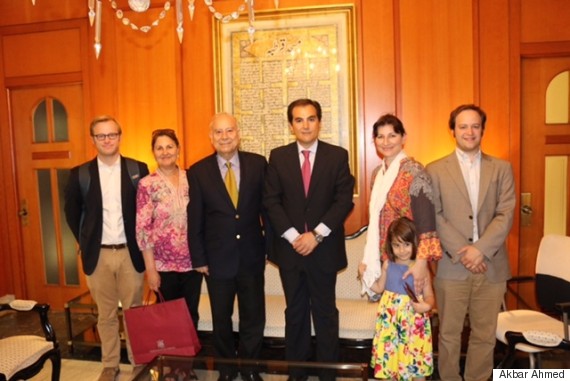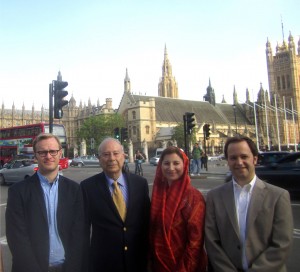
Exploring Europe’s evolving views on multiculturalism amid 9/11-heightened sense of identities among natives and Muslim immigrants sounds nothing less than attempting an intellectual tour de force.
An unprecedented new documentary, produced by American and Pakistani researchers, delves into some of the political, economic and cultural dimensions of multiculturalism in Europe, as the island — housing some of the most prosperous nations — braces for unfolding implications of multiple challenges.
These include large influx of refugees and asylum seekers fleeing ISIS militancy, unabated massacres in Iraq and Syria under the full glare of intelligence-laden civilization, young European Muslims’ getting drawn to ISIS in the Middle East and fears of home-grown militancy, impending environmental crises, and African economic woes. Hovering around top of the list is Europe’s challenge to live with its own multi-speed economies as highlighted by the Greek financial troubles. Then there are issues tied to the Ukraine standoff, relations with Russia and energy supplies.
On one level, the 120-minute production “Journey into Europe” — sourced from direct interaction between Professor Akbar Ahmed, producer and Ibn Khaldun Chair at American University, Frankie Martin, Harrison Akins, Dr Amineh Hoti, and Zeenat Ahmed and European people, politicians and religious scholars — accentuates the fact that despite their geographical affinity, each European country is distinct in its socio-political currents. The kaleidoscopic enquiry also reveals how Muslims enrich the European arts and culture through their diverse contributions, particularly painting, calligraphy, music and architecture.
At the same time, tension resulting from a growing chorus by some right wing parties for protection of western cultures as something uniquely homogenous and unmixable – no compromise on the western freedom of expression and dress codes for immigrants — and demand by the minority Muslim populations for a right to preserving their own traditional way of life – women must wear headscarf — makes some European countries edgy, with perils of divisions along ethnic, religious and cultural lines.
So, could the western democracies rediscover a middle way of multicultural life like the spirit of La Convivencia or strike what British historian William Dalrymple describes as “a kind of pluralist equilibrium” between followers of major faiths?
Or, will they yield to noisy forces of polarization and ultra-nationalism, and Europe and its immigrants turn their backs on one another in a world unavoidably heading to a much greater interconnectedness and proximity through powerful tools of globalization?
The documentary discovers contrasting scenarios in various parts of Europe in a reminder that diversity of contemporary Europe with a growing Muslim population offers unique benefits of cultural pluralism that flowered in Andalusia under Muslim rulers and Sicily under Christian leaders. But the deep-seated as well as newly surfacing differences as with the arrival of new refugees and some European states’ strict rejection of them could also have dangerous repercussions, if the gulf widens.
For example, the documentary tells us how Muslims face hurdles in building a central mosque in the French city of Marseille. The documentary covers issues in the backdrop of tensions, when France experienced shock over killing of Charlie Hebdo journalists by Muslim attackers following publication of sketches of Islam’s Holy Prophet Muhammad (Peace Be Upon Him). All European countries joined in their condemnation of the terrorist killings. But Paris has yet to come out with a comprehensive plan to assimilate its minority community of Muslim immigrants. A Muslim woman complains her scarf is discriminately banned while European women wear all sorts of hats and head coverings. In another scene, some Danes are said to claim that their way of life is insulated and vow walls of protection against any cross-cultural integration or broader inclusiveness. For many in the media, political Islam appears to be incompatible with modern western liberties like freedom of expression – an impression, which several analysts say, only helps segments inclined to exclusionary notion of “otherness.”
But there are also several hopeful stories of peaceful coexistence.
“Cordoba is a home for Muslims as well. We don’t perceive you as a threat and are ready to receive you that you should feel comfortable in this city, “Jose Antonio Nieto, Mayor of Cordoba, Spain, says with a beautifully inscribed epic poem of Allama Iqbal “Mosque of Cordoba” garnishing the wall behind his chair in office.
Then there is Palermo, hailed as a Middle Eastern town in the heart of Europe.
“Why does everyone try to land in Sicily? Because for Sicilians, no man is illegal.”
“Don’t ask me the name of God. When I come inside a mosque, I pray to Allah. When I come inside a synagogue, I pray to Yahweh. This moment I am Christian,” Leoluca Orlando, Mayor of Palermo says proudly.
Professor Akbar Ahmed reflects on current positive assimilative trend lines that give rise to hope for peaceable existence for all and media headlines that often project stereotypes about Muslims.
The road ahead is fraught with real dangers, he ponders while recognizing the need for introspection by all sides.
The challenge for European Muslims is to rediscover the passion for knowledge and pluralism that once defined Andalusia, he remarks.
“I am astonished at the magnificent contribution of Muslims to European civilization and am sorrowful at their predicament today. But Muslims have to vigorously challenge those who promote violence in the name of Islam. Europe’s challenge is to rediscover the links between the Greeks, the Muslims in places like Andalusia, the Renaissance and the Enlightenment.
“All of them share the idea of universal humanism and treating the “Other” with dignity and justice. They must reject all forms of racial or religious intolerance. If it can overcome these challenges, Europe will once again become a beacon of civilization for the world,” Dr Ahmed concludes.
As the Middle Eastern imbroglio sends shockwaves all around with countless displacements, and economic deprivations push millions of Asians and Africans to seek greener pastures of Europe, the continent is likely to face newer challenges. While European countries have been advancing on their own arc of history since Muslim and European periods of enlightenment and learning, two world wars and a cold war, the fact remains that large economies like those of Germany, Britain, France and Spain would need millions of additional young workers and experts each year to fuel further growth. Hence the need for new immigrant arrivals, and with it the imperative for multicultural cohabitation. But, as noted by The New York Times, some European countries have “failed to agree on an equitable, humane and properly funded response” to the fresh wave of migration.
“If the disproportionate burden borne by Greece, Italy and Spain is not reason enough to inspire joint and urgent action, the human suffering and relentless movement of desperate, illegal and moneyless migrants all across the continent, coupled with an ugly increase in racist attacks, should be,” the Times said in an editorial.
The emergence of Bosnia in 1990s – due mainly to US involvement under Bill Clinton — as an independent European Muslim state is an example of integration. Then there are moving stories of Italians and Greeks individually and as families embracing foreign refugees out of common bond of humanity. Besides, success of multiculturalism in countries like Canada and New Zealand holds out immense relevance for all, and not just Europeans, as it defeats the parochial notion of clash of civilizations. Then there is the story of American melting pot of social, cultural, economic and political ideas.
But for that kind of pluralism to happen successfully in Europe, its political leaders need to reverberate the message of benefits from peaceful coexistence. Contrarily, in recent years top British, French and German government leaders have expressed their disillusionment with the idea of communities living side by side. As a consequence, the situation remains in flux, with the migrant Muslim minorities complaining of the majority’s “imposition of conformity” on them.
The documentary – probing a range of European cultural and political currents and crosscurrents – marks a timely contribution toward understanding the need for interfaith harmony and draws attention to some critical dimensions of discourse on what might be the best political way forward for as vital a region of the world as Europe.
This piece originally appeared in Pakistan Today newspaper on August 22, 2015












